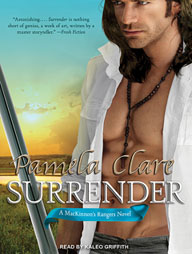 If you have been hanging around AudioGals for long, you know we hold great appreciation for Pamela Clare’s work. Her I-Team series in audio format received rave reviews from the Gals and the first in that series, Extreme Exposure, won Best 2012 Romance Audio in May. Now it’s time to take a look at another side of Pamela – her historical romances. As a long time Clare fan, I must admit that I’m even more excited to see three of her historical titles (all entries in the MacKinnon’s Rangers series) released in audio format than I was her I-Team romantic suspense series. Don’t get me wrong – I thought that series was excellent, especially in audio with the magnetic Kaleo Griffith narrating. But in my mind, Pamela in historical mode is the gold standard for historical romance. You won’t find anything that even resembles a wallpaper historical. And the characters are multi-layered and (ahhh-yes!) written true to their time. But more on that later in our interview…
If you have been hanging around AudioGals for long, you know we hold great appreciation for Pamela Clare’s work. Her I-Team series in audio format received rave reviews from the Gals and the first in that series, Extreme Exposure, won Best 2012 Romance Audio in May. Now it’s time to take a look at another side of Pamela – her historical romances. As a long time Clare fan, I must admit that I’m even more excited to see three of her historical titles (all entries in the MacKinnon’s Rangers series) released in audio format than I was her I-Team romantic suspense series. Don’t get me wrong – I thought that series was excellent, especially in audio with the magnetic Kaleo Griffith narrating. But in my mind, Pamela in historical mode is the gold standard for historical romance. You won’t find anything that even resembles a wallpaper historical. And the characters are multi-layered and (ahhh-yes!) written true to their time. But more on that later in our interview…
The first audio in the MacKinnon’s Rangers series, Surrender, releases today and I’ll be reviewing it later this week. (Review will be up the week of July 25th).
Giveaway of the MacKinnon’s Rangers Series is closed
The Interview – Pamela Clare’s Historical Side

Lea: Welcome Pamela once again to AudioGals!
Pamela: Thank you! I’m so happy to be here!
Lea: I heard you say in one of our JIAM recorded chats that historical romance is actually your favorite sub genre. Can you tell our readers about your love of historical romance?
Pamela: I did say that, didn’t I?
Historical romances were the first romance novels I read. My first was Kathleen Woodiwiss’s The Flame and The Flower. I quickly devoured her books — The Wolf and the Dove, Shanna, and so on — as well as those of Rosemary Rogers. I loved them. I was about 15 at the time. Through the 1980s and into the ’90s I continued to devour historical romances — all settings and time periods. There was a lot of variety back then — Medieval, European historicals, Revolutionary War, French Revolution, American Civil War, American West. To this day, when I want to relax with a romance novel, my first inclination is historical romance. In fact, it was only when I started writing romantic suspense that I began to read subgenres other than historical romance.
Perhaps because the books are so removed from our time and the issues we face today, they offer more escapism for me than any other subgenre. As a single mother who was the head of a household and the editor-in-chief of a newspaper, I got my fill of responsibility and contemporary issues during the day. I needed someplace to go that didn’t involve the challenges faced by a modern, empowered, career woman. That’s still true, although I’m no longer in journalism.
But more than that, I’m a student of history. My undergraduate degree was in Classics — Latin, Greek, ancient art and civilizations, while my work in graduate school was in classical archaeology and art history. It was natural that when I began to write romance that I would want to write historicals. It was the subgenre I read, and the historical nature of it fascinated me and enabled me to do historical research, which I love. I freaking love history.
Lea: The setting for the MacKinnon’s Rangers series is seldom found these days in historical romance – something that greatly attracted me to the series. Can you set the stage for our listeners and give us some background on the MacKinnons as well?
Pamela: The MacKinnon’s Rangers series is set during the French and Indian War, which played an unheralded but pivotal role in creating the United States. It has been called “the war that made America,” and, indeed, it is. People might be familiar with this period from The Last of the Mohicans with Daniel Day Lewis.
I had set my third historical romance, Ride the Fire, at the end of a brutal conflict known as Pontiac’s Rebellion in 1763. While researching that period, I came across repeated references to Colonial American Rangers. These guys were bigger-than-life fighters who had grown up on the colonial frontier and knew how to survive as well as the Indians who were their neighbors. Even today with our GPS and other high-tech gear, it would be difficult for anyone other than trained special forces to do some of the things they did.
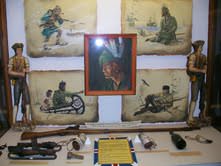
You could say — and you would be right — that the Colonial Rangers were our country’s first special forces. Our modern Army Rangers are descended directly from them, and the Rules of Ranging, put together by Robert Rogers during the French and Indian War, are still standing orders for U.S. Army Rangers, though they have been updated. (We no longer fight with flintlocks, for example, so it makes no sense to require men to carry flints.)
My imagination was captured by these men, and I knew I had to write a series about them. I decided to feature three Scottish brothers, sons of an exiled Highlander, who had grown up on the frontier. And so Iain, Morgan and Connor MacKinnon and their band of Rangers were born.
Lea: Iain MacKinnon ranks as one of my all time favorite heroes. I know part of that is due to an edge I sense in his character. Surrender seems written true to its time without the coating of political correctness we see covering so many historical romances these days. Do you see Iain standing out from the crowd of historical romance heroes? Did you feel as though you were stepping away from the norm?
Pamela: I’m so glad you asked this question!
I’ve long believed that the drive to be inoffensive to everyone, i.e., politically correct, has harmed historical romance because it creates anachronistic characters who trot around in wallpaper historical settings. I realized in about 2005 when the paranormal subgenre was getting huge that darker fantasies had migrated from historical romances, such as medievals, to paranormal novels.
In paranormals, the alpha male hero can be very politically incorrect. The standard of behavior we expect from a human male doesn’t apply when you’re a vampire/werewolf/shapeshifter/demon/dragon, and so on. The paranormal world creates a context where things like “forced seduction” and even rape fantasies, which became intolerable to many women in the past couple of decades, can flourish. (Read the elevator scene in MaryJanice Davidson’s Love’s Prisoner, a short story in Secrets, Volume 6 from Red Sage as an example of what I mean.) The heroine and hero are both off the hook, so to speak. The heroine can be tough as nails but still be overpowered by the hero, who can get away with things that would make us want to smack a human male in the face. In the end, the paranormal alpha male, like the über-alpha historical heroes of the ’80s, will eventually learn to treat the heroine with greater respect. In other words, a werewolf can get away with things that would enrage a reader if those things were done by a human male.
That is my theory, and I’m sticking by it.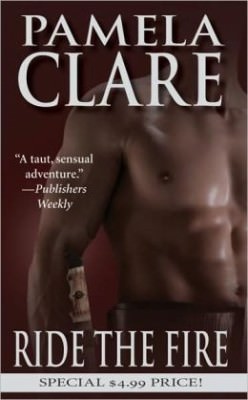
I made a conscious choice with my historicals, and especially from Ride the Fire (Kenleigh-Blakewell Family Saga #3) and onward with the MacKinnon’s Rangers books to write characters that were unapologetically authentic for their time. My heroines, apart from Cassie in Sweet Release (Kenleigh-Blakewell Family Saga #1), are not proto-feminists, and the heroes are not sensitive metrosexuals concerned with the heroine’s desire for self-realization. They are men of their time, which means they have ideas about gender roles that might seem boorish at times.
But my heroes are not domineering louts. My one rule for heroes is that they cannot ever deliberately harm the heroine physically or emotionally. But, beyond that, anything that fits the time period goes. The men in my stories are bigger-than-life heroes, men who risk their lives doing things that most men could not do in order to protect frontier families. They would give their last drop of blood for the woman they love.
Lea: Although I still see historical romance as my favorite sub-genre, I don’t read or listen to it as much as I once did. I tire of seeing 21st century behavior standards imposed on characters that lived hundreds of years ago. What do you think about this tendency to political correctness we see in romance writing these days? It’s like we remove these characters from their time in history by changing expectations of their behavior based on gender.
Pamela: I think a lot of authors do this — and a lot of readers expect this — because it makes it easier for some people to relate to the characters. A lot of women get angry at male characters that are dominating and can’t stand heroines who don’t seem to stand up for themselves. We want to see assertive heroines who find ways to determine their own destinies.
At the same time, however, that’s not how it was. The rights women enjoy now are so very recent. We haven’t even had the right to vote for a century. I focused on women’s rights as a journalist and consider myself to be a feminist, but I’m also a student of history. When I read a historical, I want to experience that time period. I want the past to come alive in 3D. I don’t want to read about a woman like myself. I’m acquainted with the modern world. I read to escape from it.
I think the tendency to blunt the less politically correct aspects of historical romances has led to historical romance losing some of its edginess. In fact, you wouldn’t say “edgy” and “historical romance” in the same sentence most of the time. But I read historicals in the day when they were epic and edgy. I try to bring some of that epic feel to my books, letting my heroes go right up to, but not over, the line. One reviewer called my books “vintage historicals,” and I like that.

Lea: Getting back to the MacKinnon’s Rangers series, can you share with us the research you did while writing the series?
Pamela: I love to talk about research!
As I mentioned, I came across the Colonial American Rangers while doing research on Pontiac’s Rebellion, an organized attack on the frontier forts and families by a united force of American Indian nations. I was fascinated by what I read and decided I had to focus on these men.
I bought a lot of books. A LOT of books. I studied Major Robert Rogers, who led a company of Rangers out of Fort Edward in upstate New York. He was an amazing man whose ability to survive in the wilderness is simply unparalleled. The kind of strength he had should be bottled. He grew up on the frontier and signed on to lead a company of Rangers against the French to save himself from being hanged for counterfeiting. We’re all so fortunate that he made this choice.
He took the American Indian method of guerilla warfare, applied some European concepts to it, and turned it into a system he called the Rules of Ranging. This changed warfare. He is the father of our Army Rangers.

I studied his journals, read the annotations. I read many history books that focused on him or on the war itself. I read collections of letters. I studied the Rangers intently — what they carried in their tumpline packs, what they ate, how they fought. And I had so many great sources of material for this. I became connected with the archaeologist who excavated Rogers Island, the amazingly talented artist Gary Zaboly, who is one of the foremost experts on Rangers in the country. In other words, I threw myself wholly into learning about their world.
I loved every moment of it. I love living alongside them, experiencing the untrammeled wilderness with them, seeing the world through their eyes.
Because my heroes were Scotsmen, I did some research on the culture they would have brought with them. One area I particularly enjoyed researching was music. I love Celtic music anyway, but I indulged myself in very old traditional Scottish music. It was a great source for vocabulary. I based the way I write the Scottish burr on the way it’s written in trad Scottish music.
Lea: As a big fan of the MacKinnon’s Rangers series, I devoured each of the three books that currently make up the series, Surrender, Untamed, and Defiant, as soon as each was released. Even within a series, you clearly write unique heroes – no “same hero type” feel from one book to the next. How do the brothers differ?
Pamela: Thank you for saying that! I try very hard to keep each story fresh.
When I worked on characterization for the brothers, I let history and psychology help me. History says that Iain, as the eldest, would have been the one to inherit his father’s lands. He would have been raised to be a leader of his clan. Morgan, as the middle brother, would have been raised to be his brother’s right hand. Connor, as the youngest, would have had a little more freedom than either of his older brothers, who were the heir and the spare. He wouldn’t have had as much direction placed on his life, though certainly he would have known that Iain was to be the leader one day.
I also tried to give each brother a quality that would permeate his story. For Iain it was honor. For Morgan it was loyalty and duty. For Connor, it was courage. All three brothers share these qualities, but each brother’s story emphasizes and tests his own special quality. Keeping this in mind helped me to build unique personalities as well as challenges for the brothers.
Characterization is everything in a novel. Absolutely everything. Learning to inhabit each brother’s mind and thoughts came easily in this case, and each brother simply took off with his own attitude, his own ideas.
Connor was the scene stealer, the one who always had something rude or witty to say. I had to muffle him a bit. More than once I found myself saying, “Connor, shut up! You’ll get your own book.”
Lea: And (gah!), what about Lord William? We want to hear more about the villain of the MacKinnon’s Rangers series who seems to be less of a villain with each book?
Pamela: I’ve loved Lord William since the first scene I wrote from his point of view. That would be the prologue of Surrender. He came to me fully developed, this privileged son of aristocrats. I’ve never thought of him as a villain. He’s much more of an anti-hero with his own sense of honor, his own notions of morality (or lack thereof). He does what he does because he believes it’s necessary, and he is not above manipulating people in extreme ways to get what he wants from them. He is a man who is all shades of gray.
In the U.S., there are readers who don’t really care for Lord William. In Japan, he is more popular with my readers than the three brothers. They love his moral ambiguity, his complexity. Neither good nor wholly evil, he has captured their imaginations, and all I hear from them is, “When are you going to write Lord William’s story?”
As Captain Joseph, the MacKinnon men’s Machican blood brother says, there’s a man inside Lord William fighting to get out. In Defiant, we see him take those first steps in that fight. In his own story, the battle truly begins. I’m counting on him to win.
Will readers love him in the end? By the end of Defiant, a great many already did.
Lea: Although we have concentrated our discussion so far on the male characters, the heroines are strong in their roles as well. It seems too bland to just say they are “highly likable” (they are) as it is more than that. They earned my respect. I enjoyed their characters and empathized with them as they dealt with their own set of challenges. Can you expand on the heroines of the MacKinnon’s Rangers series?
Pamela: The heroines in this series — Annie, Amalie and Lady Sarah — are women of their time, but they are not weak and helpless. They have a feminine strength that makes them worthy of the three brothers.
Annie — Lady Anne Burness Campbell — is the daughter of an earl who died and left her and her mother penniless, forcing them to live with Annie’s wealthy uncle. When Annie witnesses her uncle abusing her mother and her mother is then found dead, she flees his home, setting up a chain of events that eventually lands her on the frontier in circumstances she would never have imagined.
Annie actually came to me in a dream. I was working on the synopsis for Surrender and didn’t really have a heroine yet. Then I dreamed I was in the forest running from Indians, who were going to kill me. When they found me, I woke up.
Amalie Chauvenet, Morgan’s heroine from Untamed, is the most innocent character I’ve written. I wanted to show the French perspective on this war, and Amalie was my way into that perspective. But I wanted her to be different than anyone I’d ever written. She is mixed blood — metises — both Abenaki and French. After her mother’s death, she was raised in a convent. She has no real knowledge of the outside world, no experience with men. She’s not cynical. She’s utterly guileless. But I didn’t want her to be a pushover either. She has a spine of steel. The combination of profound innocence and feminine strength was a delight to write.
Lady Sarah, the great-granddaughter of the English king and Lord William’s niece was a greater challenge. Raised in a very strict religious household, she does not like the limitations place on her as woman who loves music. A talented harpsichordist, she wants nothing more than to play music, to compose, to study music, but is denied this based on her gender and her parents’ beliefs. She pays a very high price when she defies them, igniting a scandal that results in her being sent to the Americas. When she is abducted by a Shawnee war chief, Connor is sent to rescue her. What happens between them pits Connor against Lord William in a brutal test of wills.
And, oh, did I enjoy writing that!
Lea: And now we’re getting ready to experience this series in audio format with the talented Kaleo Griffith narrating. I’m so excited to see the series in audio and even more to know that they are in the hands of such a talented narrator. Have you worked with Kaleo planning for this series as you did with the I-Team series?
Pamela: Yes, I have. We spoke just last week about Untamed, which he has started. I sent him links to photographs of the real places in the stories. I also sent an overall guide to the series that I typed up for him.
There are so many languages in the series — I am a student of languages, too — and so I connected him with the woman who had translated my English into the brothers’ Scottish Gaelic.
It’s different talking about the historicals because the genesis for these stories is my fascination with history and specific historical events, whereas the I-Team stories all grew out of personal experiences I had as an investigative journalist.
I’ve been very excited about sharing these stories with him precisely because historicals are precious to me. It’s a different side of me as a writer, a different side of my creative self. I think he’s enjoying the challenge — and the stories, too.
Lea: I know you have three additional historical titles on your backlist – titles we’d love to see in audio format as well. What are the chances of that happening?
Pamela: Yes, I do! My first historical series — the Kenleigh-Blakewell Family Saga — features three books so far: Sweet Release, Carnal Gift, and Ride the Fire. The last book in that series is the one that inspired the MacKinnon’s Rangers series and is one of my personal favorites of all the books I’ve written.
The stories are set in Colonial Virginia, Ireland, England and the Ohio wilderness and tell the story of one family’s experiences here in the Americas and the rising conflict with Britain. I absolutely love the characters in this series and hope that Ride the Fire at the very least is released as an audiobook. It is a fan favorite, as well.
As for the chances… Who can say? A year ago I had no idea that the I-Team was going to be released in audiobook. Things can change overnight in this industry. I’ll be keeping my fingers crossed!
Lea: Those three titles are already sitting on our Gals’ Wish List. We hope to see these soon in audio! Thanks Pamela for joining us today. We always love talking with you.
Editor’s Note: You may want to take a look at The Annotated and Illustrated Journals of Major Robert Rogers for a more thorough look at this real life leader of a company of Rangers out of Fort Edward in upstate New York. Amazon’s “Look Inside” feature allows you to get the feel of his work without purchasing.
MacKinnon’s Rangers Series Release Schedule
Tantor Audio’s scheduled release dates for the series provides us with many hours of summer entertainment:
Surrender – July 15th
Untamed – August 12th
Defiant – August 26th
Please let us know your thoughts as you listen along with us this summer!
Time to Enter!
Giveaway closed.
Lea Hensley


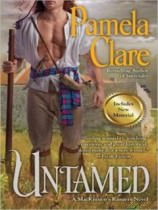
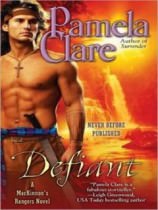



Fabulous interview! I love hearing about all this research – and I knew very little about this time of history so I will look out for these. I’m also interested in the Colonial period so will look for those books. And I’m sure Kaleo will do a great job with the Gaelic!
Thank you, Karen! I loved the questions. Thanks, AudioGals, for that! :-)
The pre-Revolutionary colonial period fascinates me with its clash of cultures and the wilderness that spread across the entire continent. It’s all very raw and so interesting.
By the way, I listened to ABOUT THAT NIGHT while taking a break from writing. I could see exactly what Julie James said when she said you understood her humor and had just the right voice for her characters. What a fun story!
Love the I-series but have never read any of her historicals. However I am such an audio fan and have been reading your column for awhile now. I just finished listening to The Prince of Midnight on YOUR recommendation and it was the first historical I had listened to in awhile. So I am definitely ready to listen to Pamela Clare’s McKinnon series. Looking forward to it! I got my sister to listen to Pamela’s I -series on Audible and now we are fighting who loves Kaleo’s voice more.
Love it! Both The Prince of Midnight and Surrender feature unusual settings (and fantastic writing AND narration). You are listening to some of the best! So happy we were helpful in your discovery.
Thanks for the compliment, Pamela! It’s so wonderful when a writer and narrator are matched well – for all involved, I think!
I am doing a giveaway of Julie’s book Practice Makes Perfect on my blog right now, btw…karenwhiteaudiobooks.com
Here’s a link to Karen’s site: http://karenwhiteaudiobooks.com
I’m half way done listening to Surrender, and I’m loving it!!! Great job all around. Good luck to all!!
Great interview :)
Thanks Lupdilup! I’m deep into listening and loving it too.
This series is one of my all time favourites for many reasons. Congratulations on the audio releases, Pamela!
Jennie – This series is one of my all time favorite historical series as well. Just doesn’t get much better than this!
“But in my mind, Pamela in historical mode is the gold standard for historical romance.” Exactly, exactly this. I love I-Team as well but Pamela’s historicals have a special place in my heart.
“I tire of seeing 21st century behavior standards imposed on characters that lived hundreds of years ago.” Yes! Same here. What’s the point of reading a historical if the characters feel like they were plucked from modern day, dressed up appropriately and dropped entirely out of context into this time? Which again is what I love about Pamela’s books, a fact you pulled out. Thanks for that!
Fabulous interview :).
Thanks Jackie! I can’t tell you what a thrill it has been to work with Pamela – first on the I-Team series and now her historical books. Surrender has been at the top of my historical audio wish list for years now.
I have always love Pamela Clare’s books. This would be a great way to listen to her books while traveling in the car and train. I get motion-sickness when reading in the moving vehicles and hate that my commute time is wasted doing nothing.
Audiobooks are the ONLY way to go for any type of driving – especially commutes IMO. :)
Great interview, Lea!
Am now listening to Surrender. And I surrender! Kaleo Griffith+any Pamela Clare (I-Team, Rangers)=better than chocolate
I need a “like” button Megan! ;)
Hear, hear!